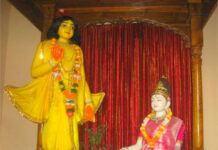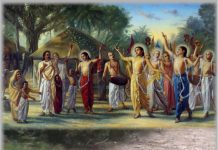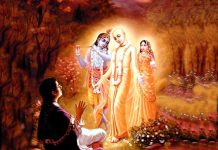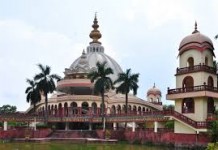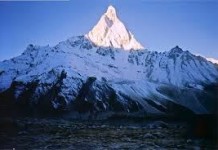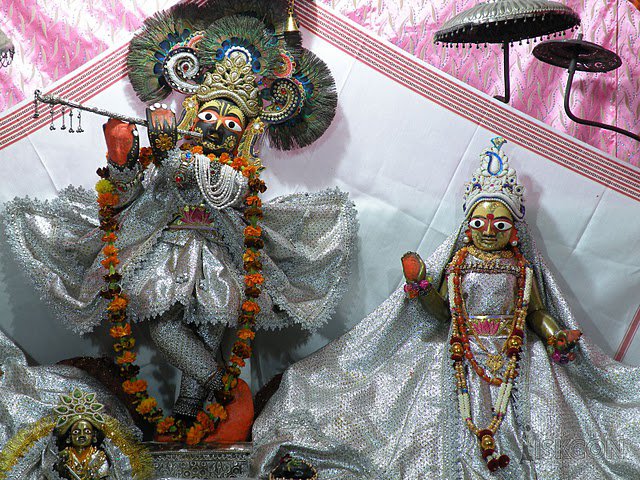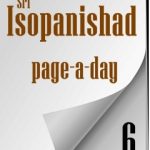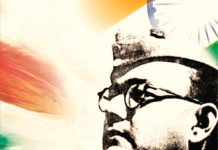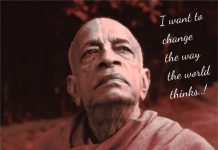All glories to Madana-mohana, who is eternal and full of knowledge and bliss. He is dear to the saintly devotees, and He is an ocean of mercy for the fallen souls.
I, who thirst to taste a drop of Lord Madana-mohana’s mercy, shall now write these sutras describing the eternal truths of spiritual life. As far as I understand, so I shall write.
Bowing down before Lord Sri Krsna Caitanya, the eternal maintainer of all the worlds, I shall now write this Tattva-sutra and a commentary upon it.
In Srimad Bhagavatam (1.2.11) Suta Gosvami explains: “Learned transcendentalists who know the Absolute Truth call the non-dual substance Brahman, Paramatma or Bhagavan.”*
In the Yajur Veda, Vajasaneya-samhita, seventh mantra, it is said: “One who always sees all living entities as spiritual sparks, in quality on with the Lord, becomes a true knower of things. What, then can be illusion or anxiety for him?”*
In the Bhagavad-gita (7.7.), the Supreme Personality of Godhead Himself declares: “O conqueror of wealth, there is no truth superior to Me. Everything rests on Me, as pearls are strung on a thread.”*
In the mangala charana of the Narada-pancharatra, the author of that book declares: “One should meditate on the Supreme Truth, who is known as Brahman, Paramatma, and Isvara. His activities are never material. He is never touched by matter. He is never touched by the modes of material nature. He is beyond the world of matter. He is the master of all. He is everything. He is the cause of all causes. He is the eternal truth, the ancient and imperishable Supreme Person.”
In the Markandeya Purana, Fourth Chapter, it is said: “Nothing is smaller than He. Nothing is greater than He. He is the unborn creator of the universes. He is present everywhere.”
Here someone may protest: Is it not so that Sri Vyasadeva and other authors of sutras must always begin their sutra books with the word “atha” (now)? The sutras “athato brahma-jijnasa” and “athato dharma-jijnasa” are examples of this. This must be done both to bring auspiciousness and to state the topic one wishes to understand. Thus when one writes a book about Brahman or about dharma one must begin with an introduction describing the topic to be discussed in the book. Why has the author of Tattva-sutra not done this?
If this protest is spoken, I give the following reply: This protest is not correct. because in the first sutra of this book the supremely auspicious Supreme Personality of Godhead is described, there is no need for a separate mangalacarana to invoke auspiciousness. Also, the subject matter of this book is self-evident, and so it needs no introduction. Therefore, without any introduction, the first sutra declares:
Sutra 1
The Supreme is one. He has no rival.
Commentary by Srila Bhaktivinoda Thakura
The Sruti-sastra declares:
“There is one Supreme God. He has no rival. There are not many Gods.”
Here someone may protest: If it were so that there is only one Supreme God and no other Gods, then that one God would have to perform by Himself all the many duties involved in creating, maintaining, and destroying the universes. He would have to perform them all without any help from anyone else.
To refute this protest, the author of the sutras speaks the following words:
Sutra 2
Because He is limitless, He has all powers, even though He remains beyond the touch of the modes of material nature.
This sutra means that the Supreme Personality of Godhead is beyond the modes of nature and He has all powers. This is so because He is limitless, which is to say that He cannot be measured or understood by direct perception of the material senses or by any other material means. This is described in the following words of Svetasvatara Upanisad (3.19):
“His potencies are multifarious, and thus His deeds are automatically performed as a natural sequence.”*
In Srimad Bhagavatam (2.2.35) Srila Sukadeva Gosvami explains:
“The Personality of Godhead Lord Sri Krishna is in every living being alone with the individual soul. And this fact is perceived and hypothesized in our acts of seeing and taking help from the intelligence.”*
In Srimad Bhagavatam (4.20.7) it is also said:
“The individual soul is one, pure, non material, and self effulgent. He is the reservoir of all good qualities, and He is all-pervading. He is without material covering, and He is the witness of all activities. He is completely distinguished from other living entities, and He is transcendental to all embodied souls.”*
In Srimad Bhagavatam (11.7.23) it is also said:
“Although I, the Supreme Lord, can never be captured by ordinary sense perception, those situated in human life may use their intelligence and other faculties of perception to directly search for Me through apparent and indirectly ascertained symptoms.”***
In the Narada-pancharatra it is said:
“The Supreme Personality of Godhead, who is beyond the world of matter, who is the supreme object of worship, whose desires are all fulfilled, and whom all living entities yearn to attain, is described in the Pancharatras.”
Here someone may protest: You consider the Supreme both beyond the modes of material nature and the master of all potencies. How is it possible to ascribe these two mutually contradictory natures to the Lord?
In the following words the author of the sutras refutes this protest:
(to be continued…)


